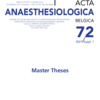Infantile postoperative encefalopathy and the perioperative risk factors: a systematic review of the literature
infantile postoperative encephalopathy
Published online: Apr 21 2022
Abstract
A systematic review of the literature was performed to describe the perioperative risk factors for developing postoperative encefalopathy in infants and how to avoid them. Intra-operative complications are more common in neonates than in the adult population, and perioperative complications in pediatric patients have an increased mortality risk. Several studies have demonstrated an association between general anesthesia in infancy and an increased risk of poor neurobehavioral outcome. The reasons for this association are still unclear. We performed an extensive literature search to describe the problem of postoperative encephalopathy and to determine the factors that contribute to infantile post- operative encefalopathy and how to avoid or treat them. Maintaining adequate cerebral perfusion is very important, as the brain is the most vulnerable organ. All factors leading to a decreased supply of oxygen to the brain should be eliminated.
Anesthesiologists could play a major role in preventing brain injury by providing safe anesthesia. This means maintaining normal homeostasis and avoiding hypo- tension, hypocarbia, hyponatremia, hypoglycemia and hyperglycemia, hypo-and hyperoxemia.
